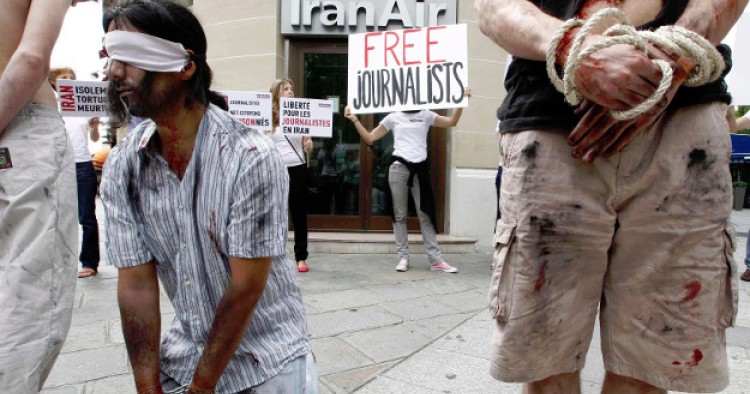As the Iranian government celebrated the 38th anniversary of the Islamic Revolution with a lot of fanfare on February 10, Reporters Without Borders (SRF) strongly condemned the regime’s persecution of journalists and systematic crackdown on the free press in the country. “Iran is now one of the world’s biggest prisons for media personnel, with a total of 29 journalists and citizen-journalists detained,” the media watchdog said. “The Islamic Revolution has seen a succession of leaders during the past 38 years but the persecution of journalists has never stopped. Only the methods used to silence them have evolved,” it added.
The report documents a relentless campaign of intimidation, mass arrests, extra-judicial executions and other methods by the Iranian regime in the past decades to silence critics and stifle freedom of expression and press in the country. “By holding journalists for years in prison, where they are subjected to torture, mistreatment and denial of medical care, the regime lets them die slowly,” it noted. Regime plainclothes agents, for example, arrested female journalist Zeniab Karimian and young filmmaker Saleh Deldam on January 23, and their families have yet to hear about their fate. The report also listed cases of Iranian authorities using corporal punishment to silence journalists, including flogging.
Comment: While President Hassan Rouhani has managed to relatively improve Iran’s relations with the West, he has done little to fulfill his 2013 campaign promises of improving the country’s dismal human rights record and guaranteeing Iranians’ individual freedoms. As the SRF notes, Iran remains one of the world’s “most oppressive” countries with regard to freedom of information. The Iranian media law allows the country’s repressive judicial and intelligence authorities to censor information and punish anyone who would publish something that would “endanger the Islamic Republic,” “offend the Supreme Leader” or “disseminate false information.” In the SRF’s 2016 World Press Freedom Index, Iran ranked 169th of 180 countries surveyed. In the run-up to the presidential elections slated for May this year, the Iranian regime’s crackdown on the free press and persecution journalists are only getting worse.
The Middle East Institute (MEI) is an independent, non-partisan, non-for-profit, educational organization. It does not engage in advocacy and its scholars’ opinions are their own. MEI welcomes financial donations, but retains sole editorial control over its work and its publications reflect only the authors’ views. For a listing of MEI donors, please click here.













